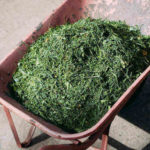
Feeding your lawn, some say, is the most important thing you can do in pursuit of a vibrant lawn. The following article will explain the why, when, and how of lawn fertilization.
Why Is Lawn Fertilization Necessary?
Fertilizer feeds your soil. In order to grow a lush, green lawn, your grass needs to be well nourished and healthy. Fertilization will essentially give it extra nutrients and improve its texture and water-retention properties. Simply put, fertilization is the obvious thing you do when you want a great lawn. “Healthy and lush landscapes are less susceptible to stress drought, pests and disease and the nutrients in fertilizer help bring out the maximum performance of plants (blooms, fall colors, etc.),” according to Steve Murray from the Grounds Guys. “In addition, lush landscapes are pleasing to the eye and promote a sense of peace for homeowners and their neighbors, and property values do increase when the landscaping is well maintained.”
When Should I Fertilize My Lawn?
This article from Scotts is amazing. Here’s the gist of it: Fertilize your lawn in the early spring to strengthen its roots. Fertilize your lawn in late spring because your grass is busy and hungry and is using up energy (also, watch out for weeds this time of the year). Fertilize your lawn in the summer to fight back against the heat, drought, foot traffic, and insects. Finally, fertilize your lawn in the fall because this is the time for your lawn’s ideal conditions, and thus, most effective for fertilizing. “Some experts will say this is the single most important lawn feeding of the year,” the article says.
Lawn Fertilization Quick Tips
- Pick the right fertilizer (this will depend on the type of grass you have and where you live).
- Test your soil’s pH level. You can buy pH testing kits for soil at garden stores or through many county extension service offices. In addition to showing your soil’s acidity or alkalinity, most tests show what nutrients your soil has, and which it lacks.
- Know the numbers. On the package of fertilizer, there will be three numbers. These will correlate to the percentage of nitrogen, phosphate, and potassium, in that order. An ideal number is 20-5-10, according to our Burke lawn care partners.
- There are liquid and granular fertilizers. Liquid fertilizers are fast-acting but you need to apply them more often. Granular fertilizers act more slowly, but you don’t need to apply them as often (once or twice per growing season).
- Choose a fast or a slow-release fertilizer. Our Lorton lawn care partners prefer slow-release because you can go longer in between services.
- Choose either chemical or organic fertilizer. Organic fertilizers are better for your lawn in the long run, but chemical fertilizers are good for a quick “greening up.”
- Buy the proper equipment. A drop spreader is fine for smaller lawns, but if you’ve got more space to work with, look into a rotary spreader.
- Don’t overspread (or your lawn will risk chemical burn!) Give it some water when you’re done to speed up the process.
- As with anything, use care when fertilizing. Clean up properly. Don’t let fertilized water run into other water sources. That’s bad for the environment.
Should I Hire a Lawn Care Company for Fertilization?
It depends. Like most laborious tasks in life, you must weigh the pros and cons. By doing it yourself, you save money and feel pride at a job well done. By hiring someone, you save time (and maybe money based on the supplies necessary), and you ensure a job well done. With a lawn care company, you get a guarantee of efficacy. Obviously, lawn care contractors do this for a living, so their reputations depend on good service. So if you hire a lawn care company, you’re saving not only time but also anxiety, because you can trust their work will be good.
As Reddit user sven_kirk says, “If I were to DIY or pay? I’d research it, but pay for somebody to it. Why? Time and money. Sure, it might take a guy 15-30 minutes to treat your yard. But how long will it take you to get the chemicals, fert, equipment, and maintenance for it all? Not worth my time. Now if this is to your enjoyment, do it.”
So the choice is yours. Weigh the pros and cons. But if you do decide you’d like to hire a lawn care company to do it, ask us about our fertilization options!
Image credit: E. Dronkert, CC 2.0.




